Daily Vocabulary Words: List of Daily Used Words in Leading International Newspapers
Hi there. Welcome to this special section @ Wordpandit.
Our endeavour here is very simple: to highlight important daily vocabulary words, which you would come across in leading newspapers in the country. We have included the following newspapers in our selection:
• The New York Times
• The Washington Post
• Scientific American
• BBC
• The Guardian
• Psychology Today
• Wall Street Journal
• The Economist
We are putting in extensive work for developing your vocabulary. All you have got to do is be regular with this section and check out this post on a daily basis. This is your repository of words that are commonly used and essentially, we are posting a list of daily used words. Hence, this has significant practical application as it teaches you words that are used commonly in leading publications mentioned above.
Visit the website daily to learn words from leading international newspapers.
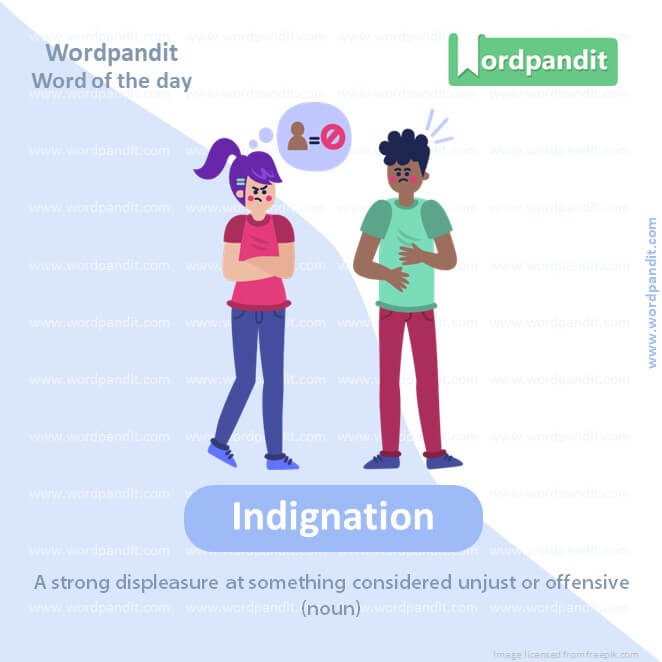
WORD-1: Indignation
CONTEXT: In order to understand why the death of Palestinian civilians fails to generate moral indignation among the Western elite as well as what likely lies ahead for Palestinians in Gaza
SOURCE: Al Jazeera
EXPLANATORY PARAGRAPH: Imagine you see someone taking away the last cookie that you were saving for later, and it makes you feel super upset because it’s not fair. That strong feeling of being upset because something is wrong or not fair is called indignation.
MEANING: A strong displeasure at something considered unjust or offensive (noun).
PRONUNCIATION: in-di-GNAY-shun
SYNONYMS: Anger, Resentment, Outrage, Ire, Wrath, Fury, Displeasure
USAGE EXAMPLES:
1. Her voice was full of indignation when she spoke about the stolen cookies.
2. The unfair decision of the referee filled the players with indignation.
3. Many expressed their indignation at the unfair rules.
4. The story he told was filled with tales of indignation against the bullies.
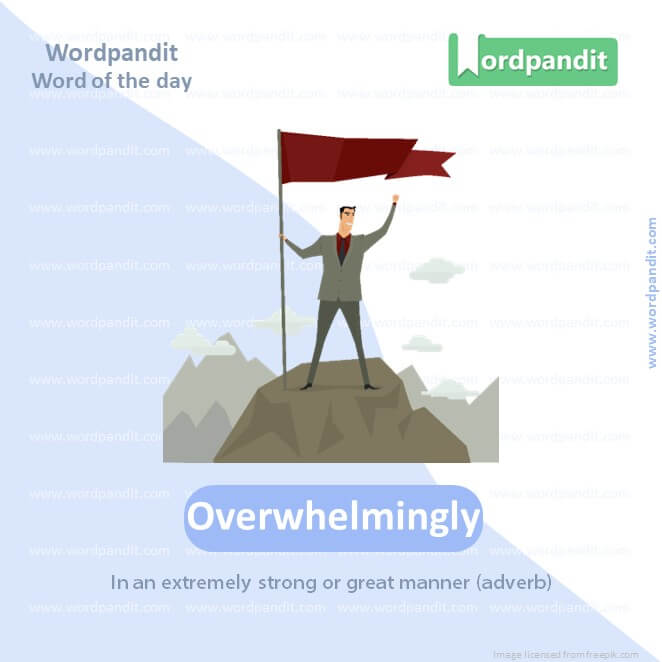
WORD-2: Overwhelmingly
CONTEXT: the West overwhelmingly continues to believe that the Israeli army is “the most moral in the world
SOURCE: Al Jazeera
EXPLANATORY PARAGRAPH: Imagine you have a tiny toy boat, and you put it in water, and suddenly a big wave comes and covers it completely. That wave was so big that the boat couldn’t handle it. When something is super-duper strong or too much to handle, like that wave, we say it’s overwhelmingly strong or too much.
MEANING: In an extremely strong or great manner (adverb).
PRONUNCIATION: over-WHEL-ming-ly
SYNONYMS: Extremely, Vastly, Immensely, Tremendously, Profoundly, Hugely, Intensely
USAGE EXAMPLES:
1. The movie was overwhelmingly popular among children.
2. She was overwhelmingly grateful for the help she received.
3. The team won overwhelmingly, beating their rivals by a large margin.
4. The dessert was overwhelmingly sweet for my taste.
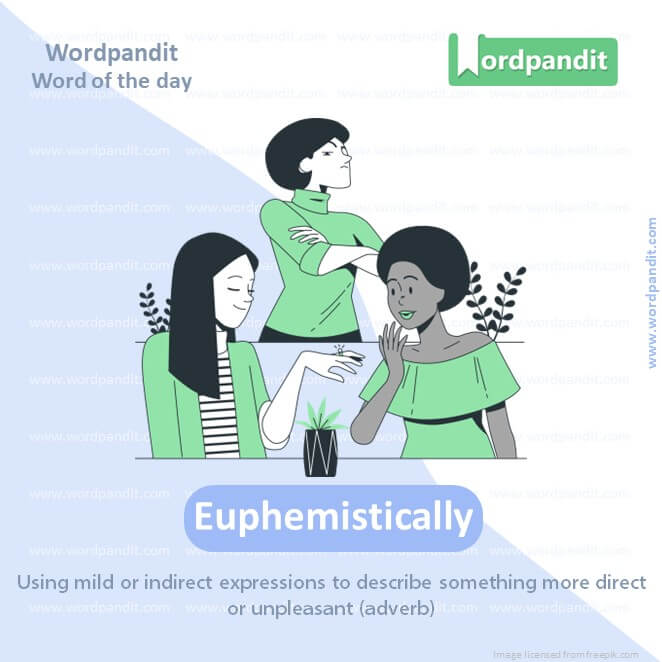
WORD-3: Euphemistically
CONTEXT: Western media outlets portray them as heroes who did not intend to kill non-combatants – euphemistically called “collateral damage”.
SOURCE: Al Jazeera
EXPLANATORY PARAGRAPH: Sometimes, we don’t want to say something directly because it might sound too strong or rude. So, we use softer or nicer words to explain it. When we do this, we’re speaking euphemistically.
MEANING: Using mild or indirect expressions to describe something more direct or unpleasant (adverb).
PRONUNCIATION: yoo-feh-MISS-tick-lee
SYNONYMS: Indirectly, Softly, Gently, Tactfully, Diplomatically, Politely, Mildly
USAGE EXAMPLES:
1. Instead of saying someone died, they euphemistically said, “He passed away.”
2. The teacher spoke euphemistically about the student’s behavior, calling it “unique.”
3. They referred to the job cuts, euphemistically, as “downsizing.”
4. “Let go” is often used euphemistically instead of “fired.”
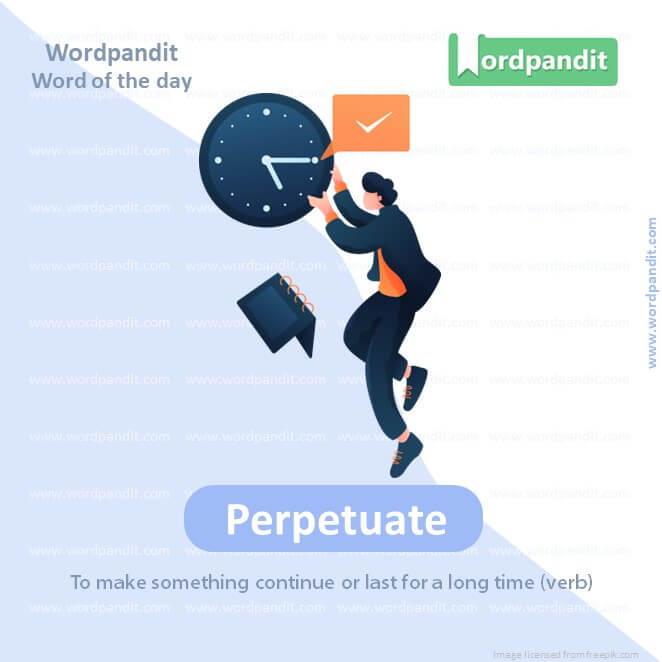
WORD-4: Perpetuate
CONTEXT: This, too, helps to perpetuate the myth of the Israeli military as moral.
SOURCE: Al Jazeera
EXPLANATORY PARAGRAPH: Imagine you have a toy that you love, and you decide to share it with your younger sibling, and they share it with their friend, and so on. This way, the love for the toy keeps going on and on. When something continues or is made to last for a long time, it’s called perpetuate.
MEANING: To make something continue or last for a long time (verb).
PRONUNCIATION: per-PET-chu-ate
SYNONYMS: Sustain, Maintain, Preserve, Continue, Prolong, Keep up, Extend
USAGE EXAMPLES:
1. The movie helped perpetuate the myth of the haunted house.
2. She wrote a book to perpetuate the memories of her childhood.
3. The ceremony was meant to perpetuate the traditions of the past.
4. Old movies often perpetuate stereotypes about certain groups of people.
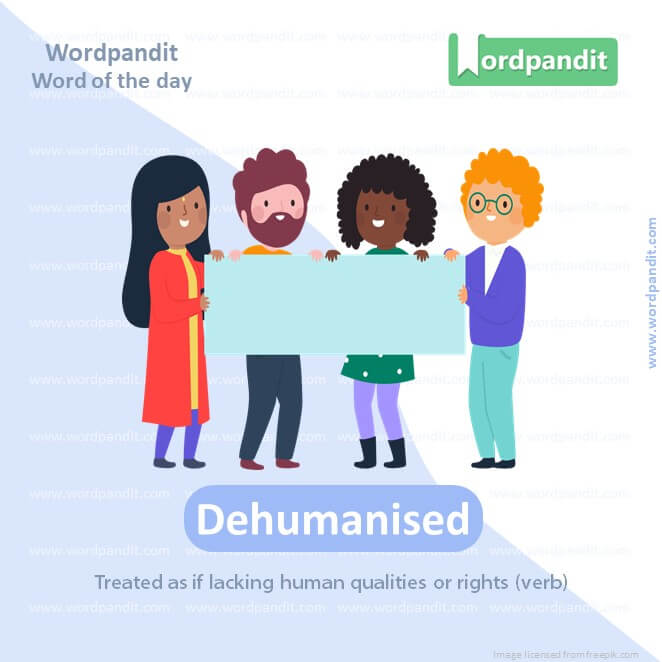
WORD-5: Dehumanised
CONTEXT: the dead are dehumanised in this way and, consequently, presented as unworthy of being grieved, the death drive will continue unabated.
SOURCE: Al Jazeera
EXPLANATORY PARAGRAPH: Imagine you have a doll that looks very much like a person but doesn’t talk or feel like we do. When people are treated as if they are not humans, as if they are just things without feelings or worth, it’s called being dehumanised.
MEANING: Treated as if lacking human qualities or rights (verb).
PRONUNCIATION: dee-HYOO-man-ized
SYNONYMS: Depersonalized, Objectified, Devalued, Demeaned, Degraded, Belittled, Reduced
USAGE EXAMPLES:
1. The prisoners were dehumanised and treated like mere objects.
2. The movie showed the dehumanised conditions in which some people lived.
3. By constantly mocking him, they dehumanised the young boy.
4. The factory system often dehumanised its workers, seeing them only as parts of a machine.
WORD-6: Brutality
CONTEXT: The US envoys doubled down on equating Hamas to ISIL (ISIS) to emphasise the brutality of the October 7
SOURCE: Al Jazeera
EXPLANATORY PARAGRAPH: Imagine seeing someone being very, very mean or harsh to a small puppy. It makes you feel bad and sad, right? When someone acts very cruel or rough, it’s called brutality.
MEANING: Cruel, violent, or harsh treatment or action (noun).
PRONUNCIATION: broo-TAL-ity
SYNONYMS: Cruelty, Savagery, Barbarity, Violence, Harshness, Atrocity, Ruthlessness
USAGE EXAMPLES:
1. The brutality of the war was difficult to comprehend.
2. Many stood up against the police’s brutality during the protests.
3. The movie depicted the brutality of the medieval ages.
4. People were shocked by the brutality of the crime.
WORD-7: De-escalation
CONTEXT: The Biden administration has rejected Arab calls for de-escalation or a ceasefire
SOURCE: Al Jazeera
EXPLANATORY PARAGRAPH: Imagine two kids arguing loudly and then a teacher comes and calms them down. That calming down part, making things less tense or intense, is called de-escalation.
MEANING: The process of making a situation less tense or severe (noun).
PRONUNCIATION: dee-ES-ka-lay-shun
SYNONYMS: Diffusion, Calming, Moderation, Relaxation, Alleviation, Reduction, Lessening
USAGE EXAMPLES:
1. The police were trained in de-escalation techniques.
2. De-escalation of the argument was necessary to avoid a fight.
3. The mediator’s role was to bring about de-escalation in the conflict.
4. The two countries focused on de-escalation measures to avoid war.
WORD-8: Repercussions
CONTEXT: the Palestinian issue at the expense of neighbouring states will have repercussions across the Middle East.
SOURCE: Al Jazeera
EXPLANATORY PARAGRAPH: Think of when you drop a stone in a pond. The water ripples out, right? Repercussions are like those ripples. It means the effects or results of an action that happen afterward, sometimes in unexpected ways.
MEANING: The effects or consequences of a particular action, event, or decision (noun).
PRONUNCIATION: ree-per-KUSH-uns
SYNONYMS: Consequences, Results, Outcomes, Effects, Backlashes, Ramifications, Aftereffects
USAGE EXAMPLES:
1. The repercussions of his decision were felt by the whole family.
2. Not studying for the test had serious repercussions on her grades.
3. The economic decisions had widespread repercussions on the country’s economy.
4. He didn’t foresee the negative repercussions of his actions.
WORD-9: Hegemonic
CONTEXT: which is seen as a destabilising hegemonic force in the region.
SOURCE: Al Jazeera
EXPLANATORY PARAGRAPH: Imagine a schoolyard where one kid is the strongest and decides which games everyone plays, and all the other kids follow that leader. “Hegemonic” is a fancy word that talks about a strong influence or control over others, like that strong kid in the schoolyard.
MEANING: Dominant or having a strong influence over others in terms of political or cultural authority (adjective).
PRONUNCIATION: heh-juh-MON-ik
SYNONYMS: Dominant, Predominant, Preeminent, Controlling, Commanding, Ascendant, Superior
USAGE EXAMPLES:
1. The empire’s hegemonic influence extended over several continents.
2. The company had a hegemonic presence in the tech industry.
3. The media’s hegemonic narratives influenced public opinion.
4. Many resisted the hegemonic culture being imposed upon them.
WORD-10: Leverage
CONTEXT: This was reflected in Blinken’s insistence that Arab partners with contacts to Hamas use their leverage for the release of all the Israeli captives held in Gaza
SOURCE: Al Jazeera
EXPLANATORY PARAGRAPH: Imagine using a seesaw. If you push down on one end, the other end goes up. This is because you’re using the seesaw to help you lift something heavier. “Leverage” is like that – it’s using something you have to get something you want.
MEANING: The power to influence or gain advantage; Using something to maximum advantage (noun). To use something to one’s advantage (verb).
PRONUNCIATION: LEV-er-ij
SYNONYMS: Advantage, Influence, Power, Control, Pull, Clout, Authority
USAGE EXAMPLES:
1. The company used its brand’s reputation as leverage in the negotiations.
2. He leveraged his connections to get the job.
3. By investing smartly, she gained significant financial leverage.
4. They had the leverage to change the terms of the contract.
Vocabulary Spelling
In the rich tapestry of language learning, getting the ‘vocabulary spelling’ right forms a significant thread. These spelled words or the arrangement of letters give each word its unique identity. However, understanding ‘vocabulary spelling’ proficiently needs an insightful and strategic approach.
Starting the journey of learning ‘vocabulary spelling’, one must focus on observing patterns. English language words often follow certain spelling rules or patterns. Recognizing these can simplify the learning process, offering a systematic way to appreciate ‘vocabulary spelling’.
The trick to ingraining ‘vocabulary spelling’ effectively lies in the power of repetition. Regularly writing words can help reinforce the spelling in your memory. To boost this, tools like spelling quizzes or flashcards with the word on one side and the spelling on the other can provide an engaging way to practice ‘vocabulary spelling’.
An unconventional yet powerful approach to remember ‘vocabulary spelling’ is by using mnemonic devices. For instance, connecting the word’s spelling with a catchy phrase or rhyming pattern can make recall easier.
Integrating technology with learning ‘vocabulary spelling’ has its unique benefits, too. Apps offer various exercises and tests that not only enhance memory but also make learning fun.
Importantly, the learning of ‘vocabulary spelling’ should be punctuated with regular revisions. This ensures the recalled spelling is correct and cements it in your long-term memory.
In a nutshell, mastering ‘vocabulary spelling’ requires keen observation, regular practice, innovative mnemonic tools, use of technology, and timely revisions. As you follow this comprehensive path, you strengthen your grasp over ‘vocabulary spelling’, paving the way to language proficiency. Remember, every word spelled correctly is a moment of triumph in the enthralling escapade of language learning!













